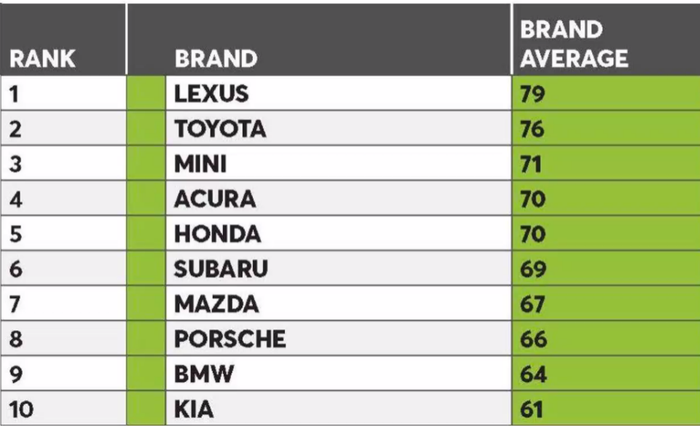
Asian and German auto brands take the top 10 spots in Consumer Reports’ reliability study of vehicles sold in the U.S.
A notable takeaway from this year’s annual ranking: Battery-electric vehicles had 79% more propulsion-system problems than did gasoline-powered vehicles. Worse, plug-in hybrid electric vehicles had 146% more such issues than their ICE counterparts.
But hybrid vehicles – with gasoline and electric propulsion systems working in tandem – had 26% fewer powertrain drawbacks compared with ICE vehicles.
It’s largely a matter of growing pains, Jake Fisher, CR’s senior director-auto testing, says at an online presentation to the Detroit-based Automotive Press Assn.
“Most electric cars today are being manufactured by either legacy automakers that are new to EV technology, or by (startup) companies like Rivian that are new to making cars,” he says. “They need some time to work out the bugs.”
One reason hybrid vehicles perform so reliably is that “their technology is about 25 years old now,” Fisher says.

CR reliability by powertrain
As for the eyebrow-raising problems of PHEVs, their propulsion systems are particularly complicated, with “more things that can go wrong,” he says. “Just look at the number of parts.”
He cites as an example the PHEV version of the Chrysler Pacifica minivan that scores below the gasoline-powered Pacifica in reliability.
PHEVs as a class are unreliable, the study concludes, but some individual models stand out. For instance, Toyota’s RAV4 Prime PHEV is one of the most reliable models in this year’s survey.
CR’s study is based on various factors, from testing done at the organization’s Connecticut test track to car-owner feedback from 330,000 subscribers to its magazine and website. Results are weighed on whether issues are serious or minor.
Among the most common problems EV owners report are those that involve electric-drive motors, charging and EV batteries.
The survey covers 20 potential problem areas, including engine, transmission, electric motors, braking, leaks, infotainment systems and build quality.
In order, the study’s top 10 most reliable brands are Lexus, Toyota, Mini, Acura, Honda, Subaru, Mazda, Porsche, BMW and Kia.
For domestic brands, Buick ranked No.12, Cadillac No.16, Chevrolet No.20, Ford No.22, Lincoln No.23, GMC No.24, Ram No.26 and Chrysler dead last at No.30.
Fisher speculates domestic brands’ relatively low ranking is, in part, because companies such as Ford and General Motors backed off making cars in favor of larger SUVs and pickup trucks.
“We’ve found over the years that it’s the small and midsize cars that get good reliability, and (the domestics) got rid of those,” he says.
Tesla, an EV builder for more than a decade now, falls in the middle of the pack in terms of brand reliability.
“While Tesla’s EV components are generally reliable, the company continues to struggle with the build quality of its vehicles,” says Steven Elek, who leads CR’s auto data analytics program. “Tesla powertrains are now pretty solid for the most part, but Tesla owners report a lot of build quality issues, including irregular paint, broken trim, door handles that don’t work and trunks that don’t close. All of these pull down the brand’s reliability score.”
Still, Fisher says: “Tesla’s Model 3 and Model Y are now the sweet spot in the automotive industry when it comes to building electric cars. While Tesla is still a relatively new car company, it has more experience producing EVs than any other automaker.”
But he also gives kudos to a relatively new EV, Ford’s Mustang Mach-E. “There is a lot to like about the Mach-E. It’s a fabulous vehicle. The more they develop it, the more it will be in the game.”

CR reliability ranking
About the Author(s)
You May Also Like
_(2).jpg?width=700&auto=webp&quality=80&disable=upscale)


